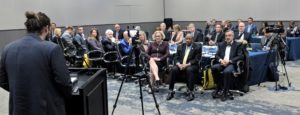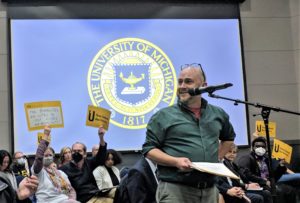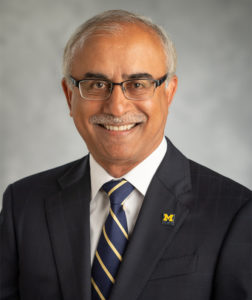
Student Body President T.J. Brooks addressing UM Regents in Flint Oct. 20 (Photo by Paul Rozycki)
By Jan Worth-Nelson
The University of Michigan Regents got an earful in public comments Oct. 20 from faculty and students concerned about the actions of UM-Flint Chancellor Debasish Dutta, controversial steps underway to respond to challenges on the Flint campus, and the use of a consulting firm the group said advocates austerity and is wreaking havoc on higher education nationally in exchange for the bottom line.
The Regents, the UM’s eight-member elected governing body, hold their regular meeting annually in October on the UM – Flint campus, this time meeting in the Riverfront Center where media and the public were cycled through backpack checks and a metal detector. It was new UM president Santa J. Ono’s first Regents meeting since taking over as the university’s 15th president Oct. 14.
During public comments, Susan Gano-Phillips, a tenured psychology professor for decades and for seven years dean of the UM-Flint’s College of Arts and Sciences, said numerous complaints have emerged — and been filed through official channels — about Dutta’s administration, alleging “discrimination, retaliation, dishonesty, coercion, bullying, and failure to engage in shared governance.”
“Dissenting voices not tolerated”
She added, “However, because of a pervasive culture of fear and intimidation. promulgated by campus leadership, where dissenting voices are not tolerated, the wellbeing of faculty, staff and students is threatened.” Yet, she said, nothing has been done.
She said a “revolving door” in offices of admissions and marketing, the turnover of six deans in two years, and at least four key positions held by interim leaders, has caused “chaos.”
Gano-Phillips said a group of former high level administrators, representing a collective 100 years of experience, are eager to speak with the Regents about their experiences, despite the risks to their professional reputations, “because we care deeply about UM – Flint.” She said so far there has been no response to the group’s request.
Dutta’s response to EVM in answer to the speakers is at the end of the article.
A request to Regents Chair Paul Brown for comment has not been answered.
In part, Gano-Phillips’ critiques and those of many of the other commenters link to the controversial “Strategic Transformation” process under Dutta’s leadership.
Before Gano-Phillips and the others spoke, both new UM president Ono and Regents Chair Brown declared their support for the “Strategic Transformation” efforts.
Campus faces challenges
At a campus town hall Sept. 23, Dutta laid out a series of concerns and challenges facing UM-Flint, including a 30 percent drop in enrollment since 2014-15, the lowest six-year graduation rate among the state’s 15 public universities, and a declining number of high school graduates statewide.
In a slide presentation, he detailed a process of what he called “market demand analysis, academic program analysis, and business case and implementation road map” which many interpreted as leading to program cuts based on economics over enrollment or efforts to support departments.
A UM – Flint website set up to describe the plan and implementation steps is available at https://www.umflint.edu/strategic-transformation/
Initial reshaping of the campus has centered partially on the new College of Innovation and Technology, which opened in 2021 to beef up the campus’s technology and STEM (Science, Technology, Engineering and Math) options. Formation of the CIT was funded in part by $10 millions from the C.S. Mott Foundation, in addition to millions in state and federal CARES Act funding, and it is headquartered in the remodeled and expanded Murchie Science Building (MSB).
The first year, enrollment in the CIT was disappointing, some UM – Flint faculty reported, and in response, UMF administration added units from the College of Arts and Sciences (CAS), the UMF’s largest, in what some observers suggested was an attempt to increase the new unit’s numbers. Others contend the moves were logical and intended to streamline and put like disciplines together.

(Graphic source: www.umflint.edu)
Gano-Phillips said “the secretive transfer of three programs from CAS to CIT in June were designed to obfuscate the obvious failures of the Chancellor’s signature strategic initiative, the creation of the CIT. CIT enrollment is just 26 percent of its year two goal, despite investments of hundreds of thousands of dollars in marketing and scholarships for many students.”
Following Gano-Phillips’ comments, students and UM-Flint alums, several identifying as working class, first generation in college from the Flint area, praised their UMF experiences but called out what they see at as a de–prioritization of the humanities, and the prospect that as resources for the liberal arts are squeezed in exchange for the technical fields, UMF’s overall prospects for survival as a vibrant four-year source of higher education — and as an affordable option for students in the Flint community — are threatened.
Sami Faye Kotob, a student in his 5th year of high school who is taking 12 hours of college classes at UM – Flint through the Early College program, lauded the opportunity to explore a variety of classes, and said UM – Flint is one of his top choices for college going forward.
“But I am concerned that while I may be able to finish my degree, the option I am given to do so will become increasingly limited. I implore the Board of Regents to increase funding and foster growth in all programs at UM – Flint, not just the ones currently deemed “in demand” by employers.”
Preserve pathways for career success
Christopher Schwartz, a 2016 UM-Flint graduate in economics and political science who has clerked for the chief judge of the U.S, Court of Appeals, said “Contrary to the wisdom of the moment, degrees in basic social sciences and humanities are vital pathways to career success. But I am worried others might not be able to follow this path if the social science and humanities at UM – Flint are not sufficiently funded — and that would be a shame.”
“UM-Flint serves underserved rural and inner-city working-class communities in an important way, gives them a path to become lawyers, PhDs, and policy analysts. That path must be preserved.”
World languages “gutted”
Making a plea for better support for diverse languages, Emily Feurerherm, a professor of linguistics in what was formerly the English Department but has now been folded into a new Department of Language and Communication, said “Unfortunately, in the eight years I’ve worked here I’ve seen our humanities and world language programs gutted. We used to have multiple majors focused on Spanish, but now only a Spanish minor remains….there are almost no advanced world language classes left, in any language.
“This is not just a UM – Flint issue,” she said. It’s a community issue…lack of world languages risks our place in an increasingly diverse country and globalized economy.”
“Fire Huron Consulting”
A passionate Jason Kosnoski, associate professor of political science, described how the use of Huron Consulting affected his alma mater, the New School for Social Research in New York City, an institution that like UM – Flint, he asserted, was founded for “people that traditional academic deemed unworthy of inclusion.

UMF Political Science Professor Jason Kosnoski asking UM Regents to “Fire Huron Consultants” (Photo by Paul Rozycki)
“Sadly,” he said, the two institutions have another thing in common –they both hired Huron Consultants to “rethink” both of the institutions — and at the New School in consequence hundreds of employees were laid off; same at the University of Wisconsin, he said, where severe program cuts, particularly in the humanities, followed Huron recommendations.
In a handout provided to the Regents, he detailed that Huron, formed in 2002 by 25 former employees of Arthur Anderson, an accounting firm that “went under as part of the Enron scandal of 2001-2002,” repeatedly “shuttered thriving programs in the humanities and social sciences and drove mass faculty layoffs” — at the University of Wisconsin’s Stevens Point campus.
“Huron does not share the values of either the New School or UM – Flint,” Kosnoski said, “So I ask one simple thing,” he said to loud applause, “Fire Huron Consulting!”
See Dutta’s answer to EVM’s request for comment about Huron Consultants at the end of this article.
“We are very excited and energized”
Not all the commenters were unhappy with the changes at UM-Flint.
Mojtaba Vaziri, a physics faculty member of 32 years, spoke as one of the faculty who were moved into the College of Innovation and Technology this summer.
Thanking Dutta and the UM – Flint’s Provost and Vice-Chancellor Sonja Feist-Price, he said, “I want to tell you that the faculty who moved are all very excited and energized, and we appreciate the efforts made to make this move happen- I think it is important that you hear this.”
“Right now we are all fully engaged in a college-wide discussion on curriculum and how to enhance them to better serve our students and community,” Vaziri continued. We are fully invested in making UM-Flint a great destination for prospective students.
He thanked the Regents for investing in the strategic transformation initiative for the Flint campus.
“In my 32 years here, I have witnessed many changes and initiatives– but nothing at this level,” Vaziri concluded. “But I also recognize that additional change is needed to transform UM-Flint towards a healthy future.”
Promising a series of meetings to elicit community responses to UM – Flint’s challenges, Dutta said Thursday he has conducted 21 meetings so far with a range of constituents including in-house stakeholders and community leaders.
Dutta’s response:
Dutta provided the following response to EVM following the meeting . He was asked to specifically address comments by Gano-Phillips and Kosnoski:
“I’d like to thank everyone – staff, faculty members and students – for bringing their passion for our university to Thursday’s meeting.
“Today, the state of Michigan finds itself in a situation where the number of high school students, and consequently, high school graduates is declining. Then, even fewer of those graduates are attending college. Something must change and institutions like ours must find opportunities for growth if they are to survive. The strategic transformation initiative will see us examine student and employer needs as well as the needs of the community. From that, we will then thoughtfully and strategically reposition the university to meet the needs of the region. Huron Consulting is not making any recommendations; they are assisting us with market data and analysis.

UM-Flint Chancellor Debasish Dutta. (Photo source: www.umflint.edu/chancellor)
“Throughout this process, we are seeking input from our students and other stakeholders on the plan before anything is finalized. The end goal is to strengthen student outcomes at UM-Flint so that the university is academically strong, financially viable, and an institution that meets the needs of the workforce for our state, providing long-term success for all.
“The University of Michigan has many channels for filing complaints that Dr. Gano-Phillips raised.”
The entire Regents’ meeting, including the public comments, can be viewed on YouTube at https://www.youtube.com/watch?v=za-nrcespBE&t=3275s
EVM has still awaiting a response from Regent Chair Paul Brown.
Banner photo: www.umflint.edu
EVM Consulting Editor Jan Worth-Nelson can be reached at janworth1118@gmail.com. Worth-Nelson worked for UM – Flint from 1987-2013, most of those years as writing faculty in the English Department, and retiring as director of the Thompson Center for Learning and Teaching.


You must be logged in to post a comment.